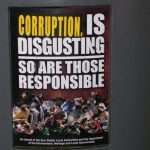Unoccupied politics
The ‘Occupy Dame Street‘ protest came to an end this morning. The ‘Occupy’ movement has often been incoherent, but at least symbolised a dissent from the economic orthodoxy which says that the poor must pay the private debts of the rich. It is an economic orthodoxy that imposes the greatest pain upon the most vulnerable, that says those who have nothing must bear the cost of the reckless behaviour of those who had, and still have, everything. It is an economic orthodoxy that does not ask why the poor are poor, or what it means to be poor.
Because the poor are poor they have spent their lives living at a subsistence level, never having an opportunity to put anything aside for a ‘rainy day’, there is no post office book or building society account to which to turn when something unforeseen comes along. Maybe the interest on savings accounts is negligible in the current economic climate, but having savings at all is an experience unknown to many people.
Because the poor are poor, they are often caught in cycles of poverty for generations, without education and without opportunities. The poor are less likely to have someone to give them a hand when things are tough. For generations, there were Irish people who received assistance from family members who had emigrated. To be able to send money home was important for exiles who crossed the Irish Sea, crossed the Atlantic or sailed around the world. We had assumed such experiences belonged deep in history, but the time is returning when going into exile will be the only way to support your family.
Because the poor are poor, there is no option to borrow through a crisis. Financial institutions do not lend to people with hand to mouth incomes and with no assets to use as collateral. The money lender with his astronomical interest rates is there in desperate moments, but his advances are likely to be no more than tens of Euro, knowing as he does that his profit depends upon a person’s ability to meet the weekly repayments. Credit, a term derived from ‘credo’ meaning ‘I believe’, is not extended to those in whom the banks do not believe.
Because the poor are poor, they must buy cheap. They have not the option to pay extra for something where the extra expense is more than compensated for by the longer life. It often means no option to make do and mend. A friend who has a pair of shoes that were expensive, but have lasted for years through occasional trips to the cobbler, will have spent considerably less on footwear than someone who cannot afford the initial outlay and who must buy new shoes every year.
Because the poor are poor, they cannot avail of discounts. They have not the cash to buy in bulk. They have not the cash to take advantage of special offers on goods that are not on the shopping list for that week. They have not the credit to sign up for special deals for those who pay on direct debit, or those who use more than a certain number of units of energy.
However, because the poor are poor and because they spend a far higher proportion of their income than other socio-economic groups, they are the ones on whom to target money if the economy is to start to move again. They are the ones who will go out and spend, getting money into circulation, creating jobs, starting an upward spiral.
But such economic views would be espoused by the ‘Occupy’ movement and we know from the fact that the Government sent a hundred Gardai against fifteen occupiers, what our ministers think of such views.



Another reason for the current economic crisis and sovereign debt problem pronounced in the last few days by former Taoiseach, former EU representative in the USA and now president of IFSC Ireland. According to Bruton the sovereign debt problem is not caused by bailing out bankers and developers nor by the disastrous impact of neo-liberal economics. No! It is caused by the Welfare state and the promise of generous pensions to workers. I wonder how many pensions Mr. Bruton has.
His Labour colleague, Joan Burton, makes much of alleged social protection fraud, the aggregate total of which would probably match the debts of one reckless developer.